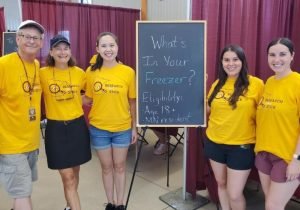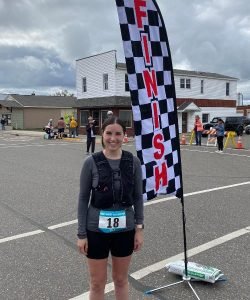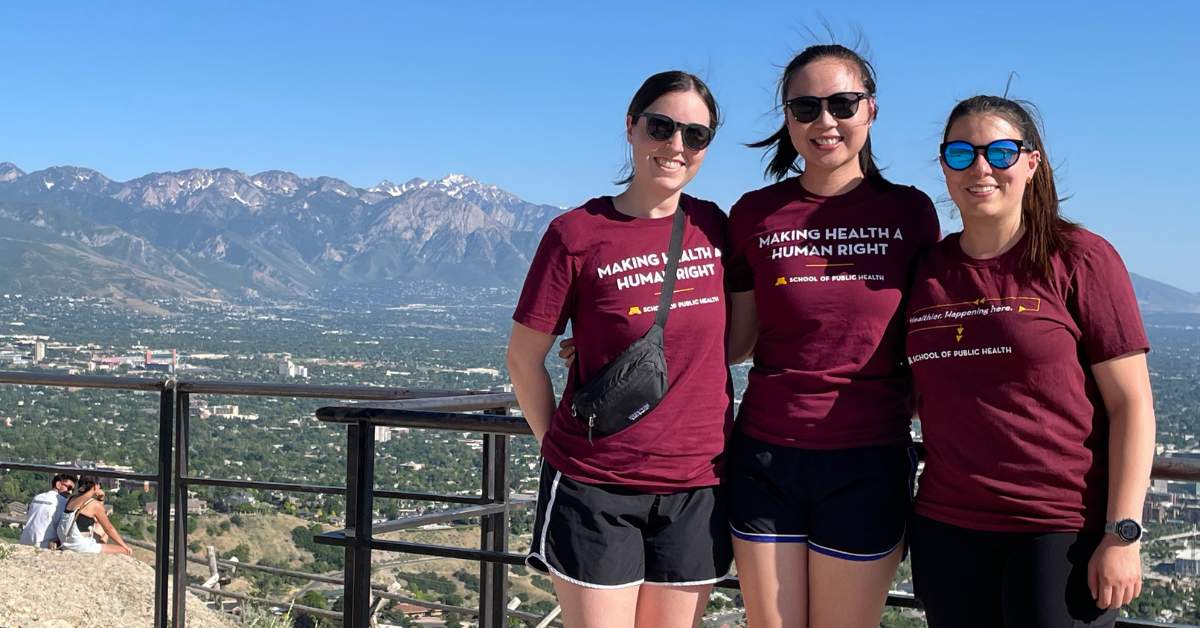I am focused on food safety and food borne illness because everyone eats food, and we shouldn’t have to be concerned that the food we eat may cause illness. That means that we need to uphold a rigorous standard for safety and have a robust surveillance system to ensure our food supply is safe.
Where did you grow up and what did you like to do?
[Lexi] I was raised in Rochester, NY. Growing up, I spent a lot of time figure skating. I participated in both individual figure skating and synchronized skating in college. My synchronized skating team eventually went to nationals and I got to compete for Team USA at the Mozart Cup in Austria in 2012! That was an awesome experience.
Where did you attend undergrad and what was your degree/area of study?
[Lexi] I graduated from Cornell University with a bachelor’s degree in Human Biology, Health, and Society after transferring from Miami University in Ohio. I did AmeriCorps after undergrad, then decided to get my MPH at the Yale School of Public Health, where I studied chronic disease epidemiology, graduating in 2020. I completed the Council of State and Territorial Epidemiologists (CSTE) Applied Epidemiology Fellowship at the Connecticut Department of Public Health focusing primarily on COVID-19 surveillance activities before coming here.
What drew you to public health?
[Lexi] I was interested in biology, but knew I didn’t want to be in a clinical role after college, so I started exploring different areas. I liked that public health is focused on prevention and helping the greater community, so I took some public health and nutrition courses during undergrad. Afterwards, I started working as a nutritionist at a local WIC agency before transitioning into grad school. Then in my master’s program, I worked as a research assistant focused on surveillance of foodborne illnesses like Salmonella and E. coli. That helped set me on the path I am on now.
What specific issue, problem, or area of research in public health do you care the most about and why?

[Lexi] I am focused on food safety and foodborne illness because everyone eats food, and we shouldn’t have to be concerned that the food we eat may cause illness. That means that we need to uphold a rigorous standard for safety and have a robust surveillance system to ensure our food supply is safe. I’m specifically interested in the surveillance of foodborne illnesses. Because surveillance relies on ill individuals to seek care and submit a sample to be tested for a pathogen, I’m curious to understand the representativeness of surveillance from an equity perspective and how it impacts our ability to detect outbreaks.
Why did you choose to come to the U of M School of Public Health?
[Lexi] I chose SPH because I wanted to pursue a program that had strong connections to public health practice and I knew my advisor had experience and connections with the Minnesota Department of Health, specifically in the area of foodborne illness and food safety. I also wanted to go to a bigger school with more class offerings, and it’s been great to have a variety of classes that allows students to dig deep into different topics within the same focus area. For example, I’ve taken four different classes focusing on food safety or foodborne illness, which was not an option at some of the other programs I had looked at.
What has been your favorite class so far?
[Lexi] I really enjoyed the courses I have taken here and am pleased with the quality of education at SPH. But if I had to choose one course, Advanced Epidemiologic Concepts (PubH 8341) taught by Susan Mason and Richard MacLehose blew my mind. It made me think of epidemiology in different ways that I continue to reflect back upon. The counterfactual framework that was taught in this course was a new and challenging concept for me.

What is your vision for an antiracist school of public health?
[Lexi] I think the first step in having an antiracist school is employing staff and faculty who represent the communities that we work with. It also includes actively recruiting a diverse student population and reducing barriers to enrollment.
What do you like about living in Minnesota, and do you plan on staying here after graduation?
[Lexi] I really do like living in Minnesota and plan to stick around for at least a little while. I live with my partner a few blocks from the Mississippi River and love being able to experience the city, but also be connected to nature.

